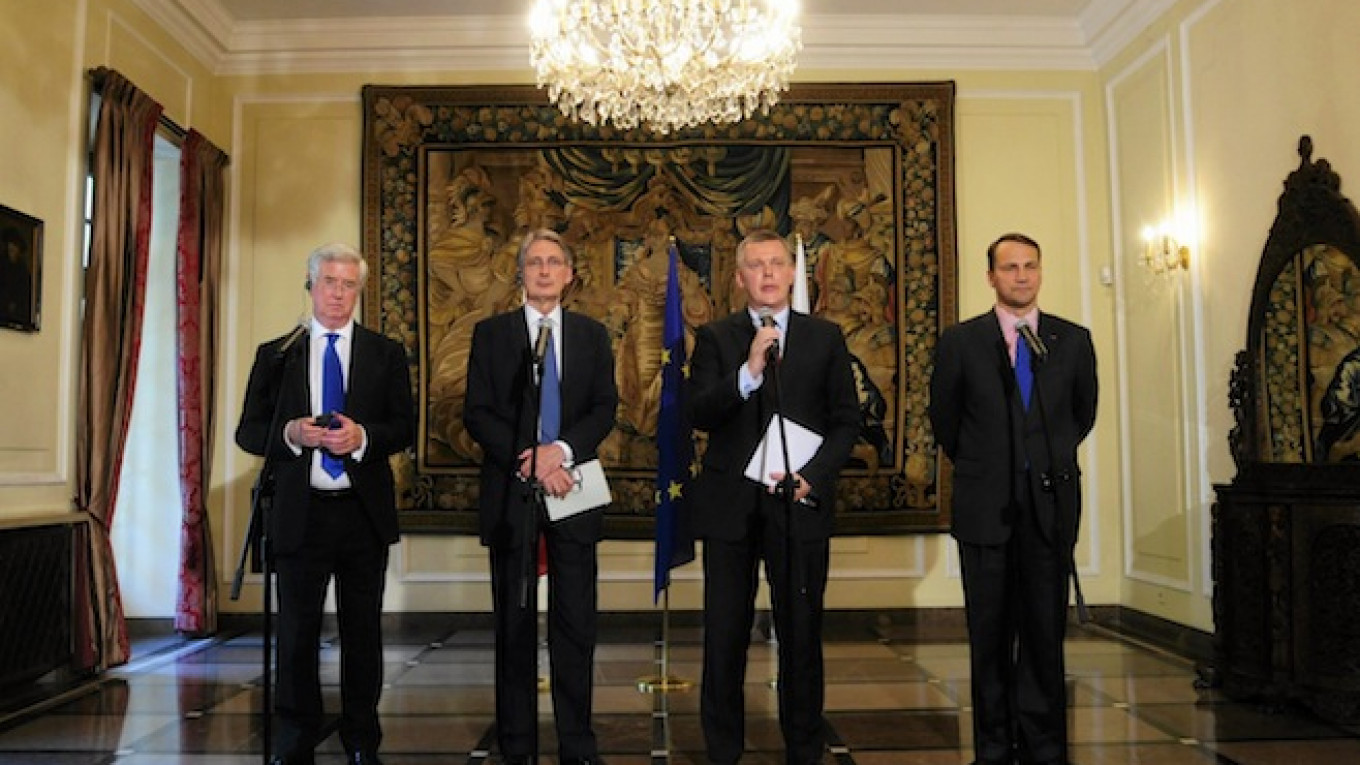LONDON — NATO is not prepared for the threat of a Russian attack on one of its members, British lawmakers said Thursday, calling for more equipment and troops to be positioned in the Baltic States.
Parliament's Defense Select Committee said events in Crimea and eastern Ukraine had revealed "alarming deficiencies" in NATO's preparedness and should be a "wake-up call."
The military alliance has stepped up exercises in eastern Europe since Russia annexed Ukraine's Crimea Peninsula in March. Ukraine is not a member of NATO.
Ukraine's neighbor and NATO-member Poland has said it wants the alliance to permanently station troops in the region as a guarantee against Russian intervention. But most NATO members are reluctant because of the cost and the risk of further antagonizing the Kremlin.
"NATO has been too complacent about the threat from Russia, and it is not well-prepared," said Rory Stewart, chairman of the committee, made up of lawmakers from the ruling Conservatives and Liberal Democrats as well as from the opposition Labour Party.
"The instability in Russia, [Russian President Vladimir] Putin's world view and the failure of the West to respond actively in Ukraine means that we now have to address urgently the possibility, however small, of Russia repeating such tactics elsewhere. In particular, the NATO member states in the Baltic are vulnerable," he said.
Britain this week said it would send 1,350 military personnel and more than 350 vehicles to Poland for a NATO exercise in October, aimed at reassuring its allies in eastern Europe.
The committee's report said a NATO summit in Wales in September should agree plans for the positioning of equipment in the Baltic States — Estonia, Lithuania and Latvia — a continuous presence of NATO troops for training in the region and large-scale military exercises including representatives from all 28 NATO member states.
NATO should also improve its existing rapid reaction force, the committee said, as well as considering establishing a standing reserve force and a headquarters focused on eastern Europe and the Baltic.
The committee said the alliance also needed to be better prepared to deal with unconventional tactics, such as cyber-attacks, information warfare and irregular militia.
Substantial Russian minorities and the influence of Russian media make Estonia and Latvia particularly vulnerable to the type of information warfare that the committee said had been used to incite disturbances in Ukraine.
"The use of asymmetric warfare tactics present a substantial challenge to a political military alliance such as NATO," the report said. "These tactics are designed to test the lower limit of the alliance's response threshold, are likely to involve deniable actors, and work to exploit political division."
The European Union and the U.S. on Tuesday agreed further sanctions against Russia, in the strongest international action yet over Moscow's support for rebels in eastern Ukraine.
Moscow denies it is arming the rebels, protestations that are ridiculed in the West.
See also:
NATO Unprepared for Russian Aggression in Baltics, Report Says
A Message from The Moscow Times:
Dear readers,
We are facing unprecedented challenges. Russia's Prosecutor General's Office has designated The Moscow Times as an "undesirable" organization, criminalizing our work and putting our staff at risk of prosecution. This follows our earlier unjust labeling as a "foreign agent."
These actions are direct attempts to silence independent journalism in Russia. The authorities claim our work "discredits the decisions of the Russian leadership." We see things differently: we strive to provide accurate, unbiased reporting on Russia.
We, the journalists of The Moscow Times, refuse to be silenced. But to continue our work, we need your help.
Your support, no matter how small, makes a world of difference. If you can, please support us monthly starting from just $2. It's quick to set up, and every contribution makes a significant impact.
By supporting The Moscow Times, you're defending open, independent journalism in the face of repression. Thank you for standing with us.
Remind me later.






